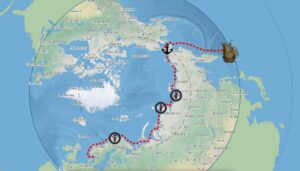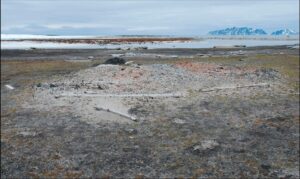A passion for the natural world drives many of our adventures. And when we’re not actually outside, we love delving into the discoveries about the places where we live and travel. Here are some of the best natural history links we’ve found this week.
Flying robots protect endangered wildlife: Scientists continue to explore ways that drones can help conserve endangered species. ‘SnotBot’ is a small drone fitted with a camera and, more unusually, a petri dish. Marine biologist Andy Rogan uses it to capture images and videos of whales and to collect whale snot.
The little drone hovers above the marine mammals and waits for their breathing spout. The fountain of exhaled air covers both the drone and the petri dish in whale snot.
“[It] has the consistency of water. It’s more like seawater than slime,” says Rogan.
The liquid contains a wealth of biological information, including DNA, stress indicators, and pregnancy hormones. They help scientists better understand the whales’ health and ecology.
Photobombing lobster
Squat lobster photobombs Shackleton’s ship: One of the biggest discoveries of the week was that of Ernest Shackleton’s ship, the Endurance. News outlets focused on how well-preserved the ship was after a century at the bottom of the ocean.
One group, however, was interested in something else. Polar biologists have been scouring the footage to see the different underwater organisms that have made the ship their home. This includes a number of invertebrate and filter feeders, such as anemones, sea lilies, and sea squirts.
The biggest surprise was a squat lobster clambering across the shipwreck. Although called lobsters, they are more closely akin to crabs. This is the first sighting of such a creature in the Weddell Sea.

Squat lobster photobombs images of Endurance. Photo: BBC/FMHT/National Geographic
Is octopus farming ethical? The demand for octopus meat is ever-increasing. Fishermen now catch over 350,000 tonnes of wild octopus each year. It is such a lucrative business that one company plans to open the world’s first commercial octopus farm in the Canary Islands next year.
It claims that farming is necessary to “protect a species of great environmental and human value”, but there has been a large backlash. Octopuses are recognized as sentient beings. They are also solitary animals that can become aggressive when kept too close to others.
“There is very strong evidence that they feel pain and distress,” says behavioral ecologist Alex Schnell. She is one of many who believe that high-welfare octopus farming is impossible.
“There’s no reliable, humane slaughter method that could be performed commercially on a large scale,” she insists. The current methods used are clubbing, slicing their brains, and asphyxiation in a net.
Crater under the Greenland ice sheet
The Hiawatha crater is 58 million years old: Researchers have dated the Hiawatha crater to 58 million years ago. NASA’s Operation IceBridge spotted the crater in 2015 while scanning the northwestern edge of Greenland’s ice sheet. The impact crater lies beneath a kilometre of ice.
Since its discovery, scientists have tried to work out how old it is. They cannot study the crater itself, but meltwater at the base of the ice had ported out sediment. Known signs of impact were found in the outflow, including partially melted rocks and pebbles containing zircon crystals. From these, geochemists were able to predict that the crater formed 58 million years ago.

A new study suggests that coral might be more resilient than previously thought. Photo: Shutterstock
Resilient corals
Hawaiian corals show surprising resilience: Coral reefs do not fare well in warmer and more acidic oceans, but a long-term study of Hawaiian corals suggests some adaptability. Researchers placed three species of coral in conditions that simulated those in future oceans. Though many died, almost half survived. Some were even thriving by the end of the study.
This study, carried out over 22 months, gives more realistic findings than more common, short-term studies. The extra study time made it clear that the corals managed to adjust somewhat to the new conditions.
Prehistoric squid named after President Joe Biden: A 10-armed prehistoric squid has been named after U.S. President Joe Biden. Syllipsimopdi bideni is the oldest ancestor of cephalopods. Scientists dated the fossil to 328 million years ago.
The fossil turned up at the Mississippian Bear Gulch in Montana. Likely a primitive version of a vampire squid, its extra tentacles would have made it a more efficient predator than contemporary species. Such fossils are incredibly rare: Because of their soft bodies, cephalopods rarely fossilize. This key piece of evidence shows that these cephalopods were on Earth 82 million years earlier than previously thought.






